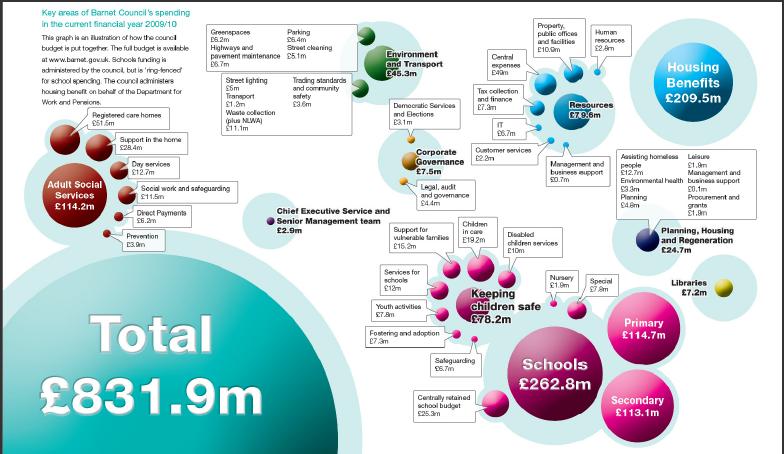I was out-and-about the other day and came across this advert:
 My local authority want me to have my say in how they spend and collect their money. When I got home, I visited the www.barnet.gov.uk/budget site accordingly.
My local authority want me to have my say in how they spend and collect their money. When I got home, I visited the www.barnet.gov.uk/budget site accordingly.
It was quite good. It went some way towards explaining how the council is funded and what it spends its money on. There are some big headline graphs that show “Barnet Council’s back office costs are amongst the lowest in London” and “Barnet receives substantially less financial support from central Government than the London average.”
It also has a budget simulator using Delib’s platform. For some reason, it only offers us the option to see the impact of budget reductions in specific policy areas (I’d like to see options to increase some of the spends). For the sake of completeness, there’s a detailed document that shows the figures tabulated, and if anyone had the time and energy, they could go through the figures and raise questions about particular elements.
But Barnet deserve credit for having also taken the figures and poured them into a good info-graphic (by the way, I’m including these images just in case they are taken down when the consultation ends).
All-in-all though – leaving the graphic aside, I couldn’t help feeling that the whole thing was being framed to suit a desired outcome. I’m sure that there are comparison charts where Barnet’s performance is closer to the mediocre than the outstanding.
Now Barnet are something of a controversial local authority. They fell out with Ken Livingstone when they removed a lot of traffic calming measures a few years ago. As the Association of British Drivers put it, “Barnet is on the front line against Ken Livingstone and TfL’s anti-car policies by adopting common sense policies on transport.” They also have a hawkish approach to social care and the EasyCouncil model are not without its critics.
I’m not here to go over these issues, but it’s worth looking at some of the more bog-standard questions that I think a lot of councils would benefit from answering. My biggest problem with the way Barnet are doing this (and I should be clear, I’m picking on Barnet because I live there – you could do a similar exercise with any council, and you may find that Barnet have gone further than most in even bothering to ask) is that there seems to be a political and managerial monopoly on the framing of the consultation.
Surely the opposition groups could have been provided with comparable resources to describe the situation differently and frame the options to suit their agendas?
Or even better, they could have adopted the following workflow:
- Follow The Conservative Party’s lead in using Google Moderator to crowdsource a set of questions from the public. Get dozens of people to ask questions (invite texts and tweets – they don’t need to all be from local residents!) and try to drive thousands of people to bid those questions up or down. Texts are crucial here – any local lists that can be used, and any way of incentivising people to do so – perhaps even a small prize for the selected questions?
- Then commit to getting an independent body (not selected by the council) to answer those questions on the council’s behalf. Invite all councillors to provide their own commentaries on the answers if they wish.
- Provide the raw data and offer a cash prize (say £3k?) to anyone who can take that data and use it to help visualise what the key decisions are most effectively. Invite a group of local residents to award that prize to the people who help improve their understanding and clarify the issues the best
- Only then, present your options to the public – and get indicative results by reaching out over the heads of the hard-to-avoids to the hard-to-reach local residents – I have a suggestion of how this could be done here.
None of this is likely to prove too attractive to councils for two reasons.
Firstly, it takes a lot of power out of the hands of unelected officials – the monopoly on describing problems was always a key weapon in Sir Humphrey’s armoury. Secondly, Barnet’s Tories would only have been human if they’d framed the questions that they wanted answered. Most ruling local groups will do this. But they did so, and it’s a bit naughty, isn’t it?
However, I’d suggest that councils may be pleasantly surprised if they did it my way. The biggest thing missing from Barnet’s current consultation model is that there is very little space for the public to tell everyone something that they didn’t already know about Barnet’s policy options.









 A blog about representative democracy, social media and a conversational politics. How will peer-to-peer communications change local democracy? How is representation changing?
A blog about representative democracy, social media and a conversational politics. How will peer-to-peer communications change local democracy? How is representation changing? 









One useful perspective here is that, for 15 years, it has been pretty leading-edge for a local authority to run a budget consultation exercise.
This includes a range of methodologies – quantitative surveys (representative sample surveys or otherwise), focus groups, deliberative research, citizens juries and referenda.
In practice, because of the way the question is framed, the effect of nearly all of them (whatever the intent) is to seek/obtain engagement and endorsement of the decision members want to take (or at least of one of their preferred options).
BTW, on the whole, these exercises tend to show people to be less inclined to ‘low tax, low spend’ than cynics would have you believe.
If anyone’s interested, there’s some evidence in research I did many moons ago with Gerry Stoker and Nick Gilby. The summary is online: http://www.communities.gov.uk/documents/localgovernment/pdf/145617.pdf
What consultation is there that achieves more? I think that Participatory budgeting (PB) stands apart from these other approaches, in the way it enables a very wide range of possible outcomes – as well as the impact from giving real financial responsibility to real people and communities (as opposed to the ‘politicians and managers’ who you perceive have framed the Barnet consultation).
But I’ll let a real expert post something about PB …